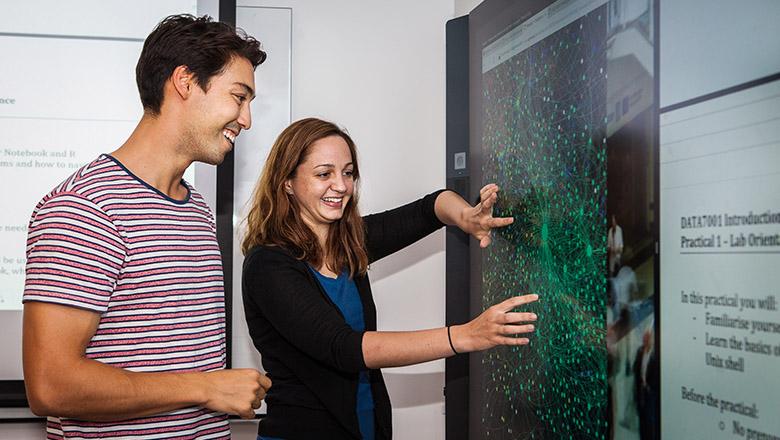Move over flying cars and robot butlers – business analytics is the way of the future. And it’s already here.
The business landscape is changing rapidly with new competitors, evolving consumer demographics and technological advancements. This continuous disruption has created a demand for analysts who can help organisations pivot and transform business outcomes by interpreting and translating data patterns.
But what is business analytics exactly, and how can studying it equip you for a successful career? Let’s explore these questions and more.
What is big data?
You’ve probably heard the term “big data” countless times, but what does it really mean? Well, big data refers to data that’s so large (no surprise there) and so complex that it’s impossible to process via traditional methods.
Here’s a shortcut for differentiating big data from traditional data:
- Traditional data can usually be presented in categorical and numerical tables. Common examples include e-commerce sales, work orders and survey answers.
- Big data encompasses such a volume and variety of information that it can’t be distilled into a simple structure or pattern. For example, think about all the data Facebook has – usernames, personal data, photos, videos, recorded messages and more.
This means big data provides plenty of opportunities to find valuable insights – but only if you have the skills and tools to decipher it. As they say, it’s not about what you have; it’s about what you do with it.
Analysing big data can help you discover business impacts and consumer insights among the data trends and patterns. For instance, you could predict customer behaviour and develop products to meet future needs.
By understanding data, organisations can gain a deeper understanding of their direction and identify ways to avoid risks in both the short and long term. This analysis is vital for helping key decision-makers to:
- address specific business problems
- make strategic, data-driven decisions
- drive organisational direction.

Is business analytics a good career?
Every organisation is looking for ways to make its business processes more efficient, which means most businesses need people with the skills to identify these steps. With the help of business analysts who can utilise, interpret and translate big data, organisations can make more informed decisions.
What does business analytics mean?
Business analytics is the process of studying big data with modern tools and techniques to find patterns and meaningful information. Business analysts collect data and determine how their company can use it to operate more efficiently and effectively.
The lucrative field of business analytics has stepped into the limelight in recent years due to:
- the increased availability of big data to businesses
- the prevalence of tools that can help companies leverage that data to great benefit.
This emerging field is already in high demand with a projected industry growth of 20 per cent over the next 3 years. This creates an excellent opportunity for graduates who have the skills to wrangle and master big data and business analytics.
Equip yourself for success with a master’s degree in business analytics
Dr Ida Asadi Someh from the UQ Business School knows first-hand the importance of data and business analytics. Much of her research has focused on organisational and societal impacts of data analytics and artificial intelligence.

As a senior lecturer in business information systems, Dr Ida Asadi Someh looks extensively at issues that affect society for the greater good – including her award-winning work on the ethics of big data.
Under Ida’s leadership, UQ has developed one of the most innovative Master of Business Analytics programs in Australia. It provides professionals with a way to upskill and adapt to the changing business environment.
Students in the program learn advanced skills in areas including:
- predictive modelling
- machine learning
- data visualisation
- descriptive analytics
- statistical analysis.
“We created this program because we saw a gap for future-focused business analytics professionals who can bridge the gap between business and IT.”
- Dr Ida Asadi Someh
A limited number of Commonwealth Supported Places (CSPs) are offered for this program, which can cover a significant part of the tuition fee.
Why study your Master of Business Analytics at UQ
The UQ Master of Business Analytics is designed for business professionals of the future and encourages a new take on data. Drawing on learnings from business, data science and philosophy, this program will help you gain a unique ability to communicate data insights across organisational functions. It will also equip you with the skills and knowledge to help organisations optimise for the future and transform when required.
What makes this program unique is its focus on business analytics for social good. You’ll learn how to interpret analytics for social, cultural and environmental business opportunities through responsible use of artificial intelligence, ethics and strategy.
This program can lead to an exciting, focused career as a:
- business analytics specialist
- business data analyst
- data analytics translator.
It may even prepare you for a future role that doesn’t even exist yet.
The UQ Master of Business Analytics offers flexible study options including online and part-time, tailored professional development opportunities and collaboration within the business analytics industry.
Looking to take your career to the next level? Want to master big data and business analytics? Learn more about the Master of Business Analytics today.





